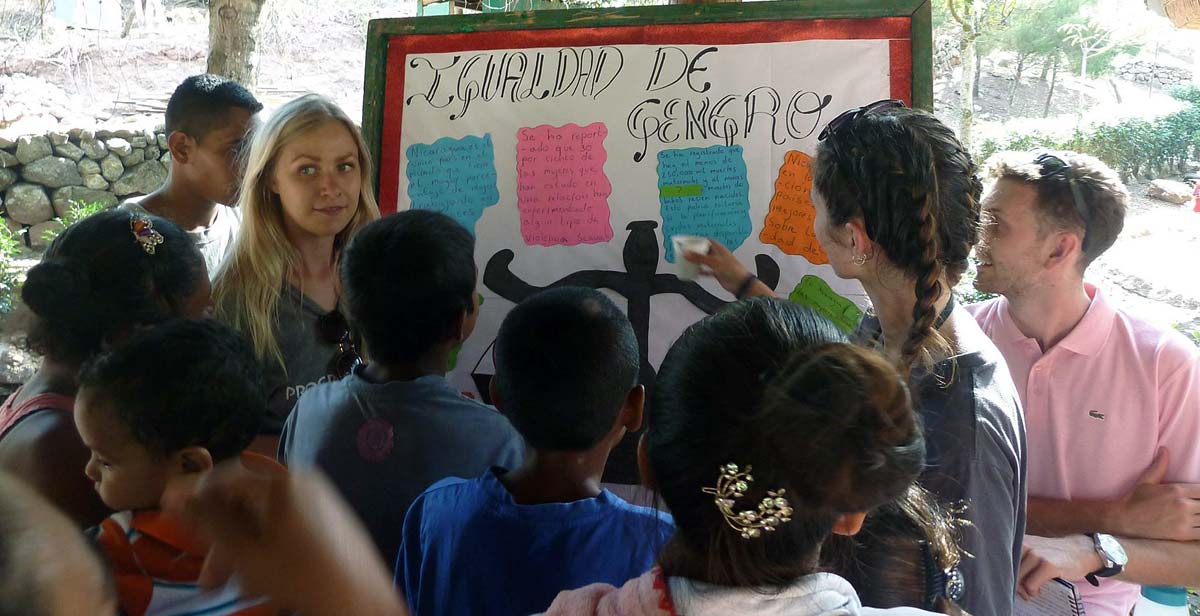This blog marks the end of our eleven weeks in Parcila and twelve weeks in Nicaragua, so it would be an appropriate time to reflect upon our reasons for coming on the project. I knew before coming here that the time would slip away from us, but that foresight doesn’t help when it comes to saying our goodbyes. There is so much I’ll miss about being here; even as I write this, my host family and our chickens are huddled in the house to escape a thunderstorm.
The first week of cycle 16 has been spent settling in to our new life for the next 10 weeks. Adjusting to a new lifestyle is something most young people rarely experience, if at all. It is easy to go your whole life comfortably without introducing yourself to a new culture, and a new way of life. Before you have experienced this change, you expect a difficult adjustment and to miss how life was before. However, in El Bramadero, Nicaragua, this has not been the case. Ever since we stepped foot in our host community, we felt welcomed from the start.
Esta semana nuevos britanicos llegaron a la comunidad, todos muy felices de conocer a los nuevos voluntarios, anciosos por conocer lo que les gusta y lo que no les gusta. Ese día tuvimos mucho apoyo de la comunidad, todos deciosos por conocer las edades de los britanicos, todos muy amables nos brindaron sus edades y sus nombres.
The volunteer we decided to produce a case study on is Delvia Martínez. This is because she stood out as a volunteer who has many different responsibilities to take care of and has learnt how to balance these in her day-to-day life. She is 25 years old and from the community of El Bramadero, Nicaragua. Delvia lives with her husband, who works in agriculture, harvesting maize and beans. Together they have two children, who are 4 and 8 years old.
Muchos de nuestros voluntarios/as ICS cuando llegan a Nicaragua no hablan el castellano. Este blog fue escrito por los/as voluntarios/as ICS después de haber pasado 12 semanas trabajando y viviendo en la comunidad de El Bramadero, y sirve como ejemplo del tremendo aprendizaje del idioma en 12 semanas.
Holly Barber-Rowe

La construcción de filtros de esta semana fue muy buena y estamos felices con la nueva experiencia que hemos vivido a través de ICS. Hemos aprendido como construir eco-estufas y estamos felices porque 26 familias podrán tomar agua sin contaminación por los filtros de agua que construimos.
It was true what they said when it was explained to us at pre-departure training that this experience would fly by in a blink of an eye. What feels like a week, has actually been a quarter of a year full of achieving the impossible, learning aspects of ourselves we never knew existed, and creating unforgettable memories.
Del 13 al 17 de junio del 2016 cumplimos la semana número 11 de nuestro voluntariado. Continuamos recibiendo nuestras clases de inglés y español, ¡ya casi hablamos dos idiomas!
Hemos trabajado en equipo ambos grupos de voluntarios pintando el mural de la escuela, en relación al cuido del medio ambiente. Nuestra obra de arte no solamente adornará la escuela, si no invitará a la gente a cuidar la tierra y la comunidad.
A night like any other night in El Bramadero waiting with my host family before Birmania (our translator) and I headed up to Casa de Doña Dolores to spend some time with the other volunteers. The strange smell of burning taints the air and invades the nostrils. Unlike the sweet scent of the pine burning in the stove, it was akin more to the aroma of burning hair. The sudden presence of this smell brakes the calm and comfy atmosphere and a more serious feeling takes over all of us.
This week we all experienced our first earthquake. Out of all of the things I thought I’d experience here, an earthquake wasn’t one of them. It happened late at night when most of the group were in bed. A few of us were up talking on the porch when the conversation was interrupted by the earthquake’s tremors. It’s not like anything I’ve experienced before but the instant it happened we knew it was an earthquake, so we stood up as if to move together to safety but then found ourselves at a loss of what to do. What do you do during an earthquake?



